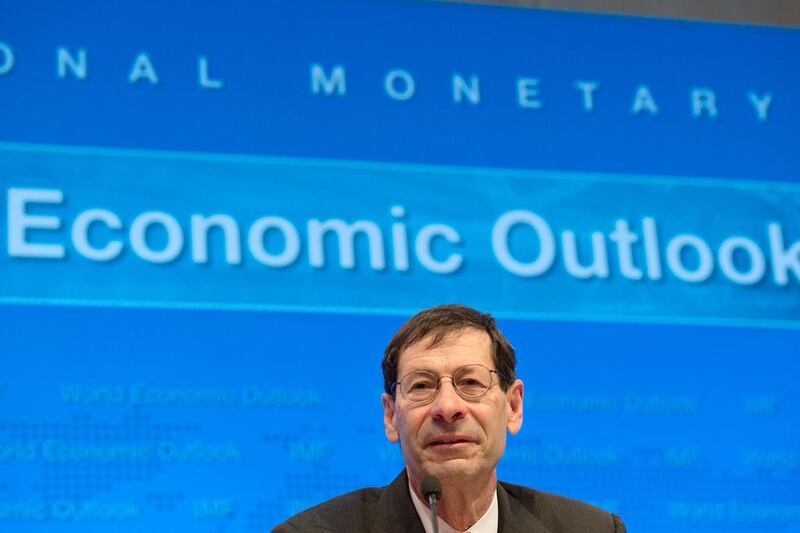The economies of the UAE and the wider world will grow slower than expected this year, the IMF said on Tuesday.
The fund downgraded global growth prospects yet again, amid signs that world has been unable to shrug off the economic impact of the 2008 financial crisis.
The world’s growth outlook for this year was cut to 3.2 per cent, a decline of 0.2 percentage points from January’s 3.4 per cent growth forecast. By convention, the world is considered to be in a recession when growth drops below 3.0 per cent.
Maurice Obstfeld, the IMF’s chief economist, said that governments need to immediately loosen fiscal and monetary policies, while embracing new labour market policies.
“Lower growth means less room for error,” Mr Obstfeld said, in a statement. “Persistent slow growth has scarring effects that themselves reduce potential output and with it, demand and investment.” National leaders must “clearly recognise the risks they face and act together to prepare for them”, he said.
“Any recovery [in the oil price] is helpful [for the GCC states] and certainly prices look a lot better than they did at the beginning of the year when we had our experience of financial market turbulence,” said Mr Obtsfeld.
“Whether this increase will be permanent or not is hard to say. Futures markets point to levels like these as being reasonable. It’s certainly reasonable to think that at the levels we have now… and as investment retracts … prices will be supported to some degree. Probably we won’t see prices at the $100 per barrel level for some time, if ever.”
The UAE can anticipate growth of 2.4 per cent this year, below the fund’s January forecast of 2.6 per cent and the country’s slowest growth rate since 2010.
The UAE grew at an average rate of 5.7 per cent per year in the decade from 1998 to 2007, according to IMF data.
Gulf states’ growth forecasts for this year have been cut significantly since October, the last time the IMF published a detailed breakdown of the region’s growth forecasts.
Qatar suffered the biggest downwards revision, from 4.9 per cent to 3.4 per cent growth, but is set to remain the region’s fastest-growing economy. Oman, Kuwait and Bahrain have also their growth outlooks cut.
That is despite a mild oil market rally, during which prices have risen from 11-year lows of just above $30 in January to above $40 now, and signs of a tentative agreement between Russia and Saudi Arabia to freeze oil production at current levels.
“This reinforces the point that the Gulf countries are set for a long period of weak economic growth as they adjust to low oil prices,” said Jason Tuvey, emerging markets economist at Capital Economics. Even after the rally to $40 per barrel, “oil prices are still significantly lower than in 2014, and none of the Gulf economies have made the full fiscal adjustment needed to the lower oil price”, meaning that they will face wider budget deficits and lower growth over the next few years, he said.
The prognosis is bleak for advanced economies and emerging markets.
Europe, the US, Canada and Japan are set to achieve growth of just 1.9 per cent this year as economists warn that these countries have not done enough to support their economies following the biggest global recession since the 1930s.
For emerging markets, large debt piles, retreating capital flows and collapses in commodities prices are slowing growth. The IMF has cut this year’s forecast for emerging market growth to 4.1 per cent this year, down from its January prediction of 4.6 per cent growth.
This figure is lifted by the inclusion of China, which the fund expects to grow by 6.5 per cent next year. That is actually an increase of 0.2 percentage points over the January forecast of 6.3 per cent growth for China this year.
However, the IMF warns that the world remains vulnerable to further bad news from the country.
“A sharper slowdown in China than currently projected could have strong international spillovers through trade, commodity prices and confidence, and lead to a more generalised slowdown in the global economy,” it said.
abouyamourn@thenational.ae
Follow The National's Business section on Twitter





